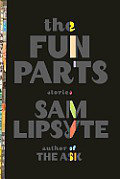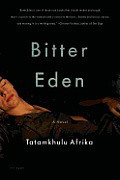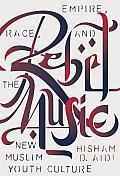Weston Cutter's Blog, page 13
March 13, 2014
The Autobiography of Richard Hell
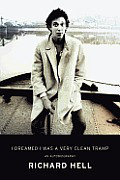 Richard Hell’s “I Dreamed I Was a Very Clean Tramp: An Autobiography”
Richard Hell’s “I Dreamed I Was a Very Clean Tramp: An Autobiography”
Richard Hell sure knows how to write one heck of a book (what? Am I supposed to resort to cliché and call it one HELL of a book? Fine. That applies, too). I Dreamed I Was a Very Clean Tramp is by no means the first major piece written by this ‘musician,’ rock star of Television and the Voidoids.
Why the quotes around musician? He hasn’t shown that side in years, hasn’t clung to the past embarrassingly like so many other artists, desperately desiring to have the gusto and sex appeal of teenagers far into their 50s. Instead, he’s become a pretty great music writer, cultural commentator, film critic, and so on. But really, we all wanted him to write about the one subject in which he has the exclusive story: his own life.
I Dreamed doesn’t disappoint. Honestly, I didn’t have super elevated expectations in the first place, so I was quite pleased to find out just how much I loved reading this book.
First off, Hell doesn’t write like any old Joe Schmo about his life – he has got a literary VOICE. It’s a bit reminiscent of Hemmingway – strong, to the point, without the unneeded adjective or run to the thesaurus. Lately on this site, I’ve been professing my adoration for all prose flowery and delicate, but really, I love a good blunt style as well. I love a true voice done well.
Unto the actual plot of his life: Hell starts the story back as Richard Meyers, back in Kentucky, growing up tramping around in the guise of a small cowboy, planning the runaway-from-home plans that only children can. That’s one thing that seems to course through Hell’s personality even today – his irresistible desire to simply “run away.” From who, from what makes little difference in the details, it’s more like that ingrained spirit of a gypsy in his heart.
There are the stories about how the man could never be suited to a conventional life. He’s a high-school dropout (albeit a marvelous well-written one); he didn’t even try to defect from Vietnam, simply told the suits in charge that he’s not really a team player, that he’d probably end up getting pissed off and getting in trouble; before Television, he never held much of a steady job. Through this, though, Hell isn’t idealizing the life of dropouts and rockstars lucky enough to break in to the place that pays for a living. As he says, “it’s part of the beauty of rock and roll that it’s about people with no conventional skill, but only assertive youthfulness, becoming fascinating.”
Of course, as the audience desires, there’s the tales of the glory days, the days of Television and being rockstars and playing for screaming crowds of women that sneak backstage in attempts to hook up with the bassist. Humbly, Hell talks even less about his own sound and his own groups than he does about the others in his weird circle of punks: Patti Smith, Sex Pistols, New York Dolls, the Ramones, etc. It’s really the story of what you didn’t get to see of Television on stage.
Along the way, of course we get stories of his favorite sins: girls and drugs. Girls, especially. The way he writes about women might be offensive if it wasn’t so heartfelt-ingly honest, and really, hilarious. He’ll write about a girl (likely someone you’ve heard mention of before like Nancy (of Sid and Nancy fame) or some other girl famous in that scene) saying things like: She had a heart of absolute gold. And her breasts were AMAZING. You can’t even judge him for it; he really did seem to care about the majority of these girls, and perfect breasts just came as the spoils. As for the drugs – there’s less analyzing of the effects on his mind than just a report on usage and the points at which it became a problem.
Really, throughout the whole thing, Hell is brutally honest about whatever you want to know, whether that’s what it was like to fuck a girl named Cookie or have your album cover consistently on the list of “Worst Album Covers by a Major Artist Ever.” Here’s a great quote that stuck with me about how much this guy DOES NOT want you to idolize him as a god:
“All my career I’ve been described as quintessentially “cool” or “hip.” I suppose I’ve fostered this, on levels, in order to seem desirable to girls and to avoid standard hypocrisy and consumer life, but I am not cool. I’m cranky under pressure, I’m a mediocre athlete, I get obsessed with women, I usually want to be liked, and I’m not especially street-smart.”
Before I go, I have to give proper respect for the way ends his bio: as soon as it gets to the part where he quits music and becomes a writer (“the only satisfying possibility”), he ends the book within a page, knowing the audience rarely cared about the days after the glory, Britney’s Vegas years, etc.
Hell knows what he is doing. This book’s a goldmine.


March 11, 2014
Nadifa Mohamed’s Orchard
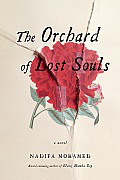 THE ORCHARD OF LOST SOULS by Nadifa Mohamed
THE ORCHARD OF LOST SOULS by Nadifa Mohamed
Author Nadifa Mohamed has a complicated relationship with her home country of Somalia. Although her family fled the country in 1985 when she was just 4 years old, before the worst days of the war were to come, Mohamed still identifies with Somalia as much as her other home of London. She recognizes the beauties the country has to offer, including a poetic language that “allows anyone to speak like a character in a Shakespeare play,” as well as the ways her life would have been different had she never left (for instance, it’s very likely had she stayed in Somalia during the tumulus years of the late ‘80s, early ‘90s, she would have never learned to read).
It’s this mixture of love and realism that make Mohamed’s second novel The Orchard of Lost Souls such a haunting read. Literally handed down from stories she’s heard from the older women in her life, Mohamed’s tale is one impossible to be written by anyone less familiar with the country and its struggles. It’s not a stretch in the slightest to call Mohamed the Khaled Hosseini of her country.
The story starts in a stadium, 1987. Three women among the thousands gather there for a military celebration, their stories intersecting at the beginning.
There’s Kaswar, a lonely old widow, mother without a child, who lands herself into prison after getting in the way of the guards, standing up for a young girl acting out. Kaswar journey through this women’s prison, filled with prostitutes, destitutes and the like, as well as her return to her empty home surprisingly leads her to find the daughters she was never blessed with before.
((Note here: If there was ANY section I’d wished Mohamed would have expanded upon, it’s in the stories of the women in this prison, handed down nicknames such as China or Stalin to match their spit-fire personalities. I would have read a whole book about these women.))
Next, there’s the youngest of the group, 9-year-old Deqo. She’s left her refuge camp in search of the most base of human necessities: her very own pair of shoes, a luxury she’s never before afforded. If, like me, the idea of a 9-year-old wandering throughout ANY country, nonetheless one of the brink of war, gives your heart a pause, you’re at the beginning of Mohamed’s feelings towards the girl.
Finally, there’s Filsan, a fierce female soldier even though she’s barely older than a girl herself. It’s a tough life, being a woman amidst a literal army of men doubting your abilities and the reasons why they shouldn’t just grab your ass, but Filsan has no problem sticking up for herself. She does struggle, though, not with the oppressive rules of her country, but with the oppressive rules she places upon herself.
In between and surrounding all this are the heart-rendering stories of the others living in dying in the country/ in the war. Bodies pile up in the back of a truck, loosely covered by a blanket and the soldiers sitting next to the corpses like hunters proud of their kill. Men die in the streets, leaving women half their size to dig graves and push their remains into shallows burial grounds. Children are bled dry, their blood going to the fighters on the “right” side of the battles.
It’s undeniably bad for everyone (at least everyone we meet), but it’s hard to believe anyone has it worse of than the women in the stories. Girls are shamed, circumcised young, and continue to have sex with men who are not their husbands anyway, sometimes because prostitution is the only way to live, sometimes not. As Filsan finds, even being in an army offers inadequate protection for a girl.
Really guys, this book is incredible. Yes, it’s difficult to hear about little ones getting their blood drawn out and women getting beaten for standing out, but there’s also so much beauty, redemption and heart in the book (it’s not like I’m going to give it anyway in this review, though – you have to earn that stuff by reading all the horrors as well). Ultimately, though, it’s a book you need to read.


March 6, 2014
A Quick Cram Session
End of the month, books came pouring in and I just couldn’t keep up. All these books are worth more time, so apologies due, but anyway: CRAM SESS.
This was a wildly funny, darkly comedic read. Like, I know you can call everything from “The Mindy Project” to “New Girl” dark based on who’s asking, but really – if you think Mindy Kaling is dark, yeah, maybe keep thinking that and don’t read this book right now.
Story topics include, but are not limited to: (1) A male doula (or “doulo,” because calling a man a doula is kind of ridiculous, don’t you think?) with some very severe mommy-issues, (2) A ‘hereditarily’ chubby boy waiting for the day his metabolism will begin (3) a super intense and quite possibly evil Dungeon Master. It’s super fun. Get crackin.
BITTER EDEN by Tatamkhulu Afrika
Published for the first time in English, Bitter Eden delves into the lives of three men held in a WWII prisoner camp, what they do to survive and how they keep themselves entertained throughout the days.
Although the three men enter the camp sure of their heterosexuality, in a male-only camp, the lines between best friends, those who have your back, and bunk mates necessary to fight off the cold blur, causing the men to question if their companions are something more. With poetic prose coupled with the often despairing story, Bitter Eden is a haunting read.
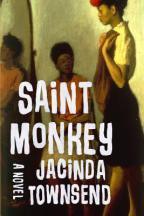 SAINT MONKEY by Jacinda Townsend
SAINT MONKEY by Jacinda Townsend
Audrey and Caroline (often called Pookie), two young girls growing up in the 1950′s rural Kentucky, become best friends based on a mutual ugliness/ awkwardness. Both fatherless at any early age- Audrey’s dad dying too soon, Caroline’s placed in jail after his brutal murder of her mother- the girls rely on grandmothers, the women of their small town and each other to figure their way from the awkward adolescence into womanhood.
Their paths diverge – Audrey heads to New York City, playing the piano for sold-out crowds and discovering the Harlem Jazz enclaves; Caroline stays home selling cosmetics and keeping her head held high above the judgements of her small town- but over the years, the girls connection never quite parts.
Townsend’s debut novel is an amazing tale of coming-of-age, keeping friendships through different states and circumstances and life for young black women before the Civil Rights Movement did anything to help. I’m keeping an eye on her, and you should, too – after all, Toni Morrisons and Alice Walkers aren’t created overnight.
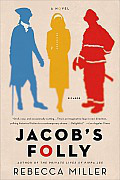 JACOB’S FOLLY by Rebecca Miller
JACOB’S FOLLY by Rebecca Miller
Spanning generations, centuries, cultures and continents, Rebecca Miller’s story examines the ties and traditions of religion, family and tradition have on an individual’s dreams.
There’s Jacob Cerf, a young Jewish street peddler, torn out of an unhappy marriage and into the heights of French society by sheer fate. There’s Masha, the young woman following out her dreams of acting while trying to keep in line with the rules of her faith. And then there’s Leslie, a man who’s had the desire to be a firefighter in his blood, even though the career took the life of his father. Each character’s story is exhilarating and enticing, but once you figure out how the three are connected, things really begin to shine.


March 4, 2014
Rebel Music: Race, Empire and the New Muslim Youth Culture
Somali rapper K’naan uses his popularity to speak out about the kids of his home country, as well as his Muslim faith. Mos Def proudly recognizes his religious identity, outside and inside his art. Even 50 Cent has tracks with titles such as “Ghetto Quran,” and Rihanna’s music video for “Hard” was undeniable influenced by the War on Terror.
Where am I going with this? Nowhere, really – those things don’t have that much in common, really, plus, there’s not that much to dissect further within them. But, for whatever reason, it’s kind of what I expected Hisham D. Aidi’s Rebel Music: Race, Empire and the New Muslim Youth Culture to be about. Not so. Not to say that makes it a bad book, just one I was unprepared to read.
I really did think this was going to be a novel about the rise in popularity of musicians adopting Middle-Eastern styles and cultures, even to the extent of reusing Muslim cultural aspects, and/or about the top Muslim musicians making their way in the industry. What Aidi gives us instead is an explanation of the reasons behind the rise in popularity, young Muslims’ attraction to both music and religious choices, plus tons of cool knowledge on the state of Muslim youths today.
Disclaimer here: Since I totally thought this was gonna to be mainly about music, since I’m not at all Muslim and about as conscious of the religion as anyone who was in elementary school on 9/11, I do feel a little unqualified to write any kind of critique on the book. I absorbed what I absorbed, but I can’t even communicate the stuff in this book that went over my head. Aidi is an intellectual and his book is basically an academic piece of research, so fair warning to any of you thinking this would be just a fun read to learn about some cool cultural music.
What is in this book: mind-blowing things I have never heard about and never would have imagined. Like, most of us have heard that there are different types of Islam – some that are more extreme/not necessarily as extreme as Bin Laden, but yeah, tough, and some that are more loose, more approachable to newcomers and more lax about some of the religion’s regulations, BUT, Aidi takes that knowledge and builds on it.
For instance, did you know in attempts to promote the less extreme sects of Islam, government agencies actively tried to promote Muslim rappers in target neighborhoods to bring impressionable youth into the less extreme side of things before they joined extremists (it’s in the book, I’m not making conspiracy theories out of air here)? Did you know that some devout Muslim rappers will make a traditional album with bass and percussion AND an album of vocals only so conservative followers can listen as well? It’s these kind of things that make it a fascinating read, even if you have no introduction to the world of Muslim rap.


March 3, 2014
A Brief Interview w/ April Wilder
 All of the below is an interview conducted over email with April Wilder, author of THIS IS NOT AN ACCIDENT, a remarkable collection of short stories published recently by Viking. The collection’s an astonishment: the stories are swerving, strange things. I don’t know if I know how to write all that well about the thing—story collections more and more seem almost infinitely strange, each one so itself that talking about them as a anything other than single, strange things feels like a trick. Here’s what I’d say: it’s a book of restless, sometimes desperate people. I don’t mean either of those adjectives to sound critical: these are stories of folks who are trying to understand things—their past, their current impulses, someone else’s strange claims or ideas—and they hungrily chase after that understanding wherever it leads. That sort of book. I’ll say this: you know how sometimes you can sort of tell how stories will shake out right when you start them? Like, you have a sense of what might happen, either in two pages or in the last paragraph? Not so for April Wheeler’s stuff: her stories were studded with surprises, every one of them.
All of the below is an interview conducted over email with April Wilder, author of THIS IS NOT AN ACCIDENT, a remarkable collection of short stories published recently by Viking. The collection’s an astonishment: the stories are swerving, strange things. I don’t know if I know how to write all that well about the thing—story collections more and more seem almost infinitely strange, each one so itself that talking about them as a anything other than single, strange things feels like a trick. Here’s what I’d say: it’s a book of restless, sometimes desperate people. I don’t mean either of those adjectives to sound critical: these are stories of folks who are trying to understand things—their past, their current impulses, someone else’s strange claims or ideas—and they hungrily chase after that understanding wherever it leads. That sort of book. I’ll say this: you know how sometimes you can sort of tell how stories will shake out right when you start them? Like, you have a sense of what might happen, either in two pages or in the last paragraph? Not so for April Wheeler’s stuff: her stories were studded with surprises, every one of them.
The interview, as you’ll note, was sort of addressed in one big para by Ms Wilder below, and rather than cut/paste, I think it’s easier to let her full flow just be. Again: the book is This Is Not An Accident, and it really is really, really good.
Questions:
1. In the loosest and/or most general way, how did you come to writing and/or what are some influences on your stuff? And/or, is there some aesthetic community of which you feel your work’s a part–like, are there other authors working presently whose work you feel yr work’s sibling-ish to?
2. I’m curious, too, if you can talk at all about place and location in the book–certainly the west comes up in the book (and in reviews/whatever of the book), and while I don’t think it feels like some deeply western book, it does feel like a deeply of-place book (I’m midwestern, so the Chicago/Wisconsin ones, for me, thrum). How much does place effect these stories, or, anyway, your writing of them?
3. This might be too tough to get to, but I’m curious: how long do yr stories take to ferment and coagulate? I ask because they feel, in ways lots of stories I’ve read don’t, as if they’ve been built very well/carefully over some time–they feel *accreted* more than written (in this, I think, they feel weirdly a bit like Heathcock’s VOLT). Maybe this really is just the dreaded process question–take a crack if you’d like, but ultimately I’m trying to ask about this incredibly careful patience that all but radiates out from these stories, and 1) if that’s a deliberate thing and 2) how you achieve it. (lord, maybe the q just sucks–if it does, I apologize).
4. This is more personal than I feel 100% comfortable asking, but here goes: your bio lists you as being a mother to a daughter. I’m curious (as a parent to a baby daughter) if or how your writing changed once she was in your life? I don’t know the timeline of all these stories, so perhaps all of them were written once you were a mother. Anyway. I apologize if this is overly personal–you should know it’s almost 100% selfish on my part (I find myself asking writers about this more and more now that I have a child).
5. Elsewhere you’ve noted you’re at work on a novel–can you talk about it, at all? And not even about the stuff of it, if you’d rather not: how’s the writing of it significantly different from the story collection, if at all? Is it harder, or easier? And do you have any soapboxy pronouncements or notions regarding novels vs story collections, the place of literature in the public sphere, etc? (sorry if that finishes flippant–it’s not intended as such).
6. What’s the view out your window?
Answers:
The “how did you come to writing” and “of place” questions tie together for me. In my experience, writers (maybe artists in general) are people who for whatever reason, wind up having cultivated an inner life that’s more vivid than the outer. For me, it was moving around when I was young. I have nearly eidetic memories of daydreaming in the back of one of my dad’s second-hand Cadillacs (the mini-hearses, is what we drove) while we passed some place on the way to some place else. I think anyone who grows up in a chronic state of Outsider will come naturally to pay attention to the pace of life here versus there, what’s cool and who’s cool and how can you get that way yourself quick; even, what these things might have to do with the climate and sun’s slant, the beer or chocolate factory on the outskirts of town. As a reader, I get excited when it feels like a story couldn’t happen anywhere other than it does. Part of me would like to think you could fall in love with a guy in Chicago on a certain night who would escape your notice entirely in Santa Monica on the same night. The book’s epigraph from Sartre is there because for a long time the collection was called “We Eat The Color of Cake”—which was an idea that blew my mind when I read it, that two pieces of otherwise identical cake taste differently if one is red and one is yellow. I don’t know if that’s what Sartre was saying, I was a ridiculous philosophy student, but while I’m at it… there is also the tradition you find in Plato’s Republic where movement in space signifies philosophical movement. So the novella is, on many levels, “all over the place,” but some of that was planned (for the rest, sorry, and thanks for persisting, if you did). I wanted to think about what it means—and specifically what it means to Eckhart psychologically/metaphysically/what-have-you-ly—to move from LA (where his neighbor sells pot edibles for a living) to Salt Lake City, Utah (basically a theocracy). And, importantly, to do so in the aftermath of his father’s death and family’s disintegration. Wherever I’ve lived, there have always been these wild characters going about in plain view breaking like a 100 taboos, and everybody has seen them or sort of seen them, but they’re so out of frequency, socially, that they’re essentially invisible. Maybe they’re homeless; often you can’t tell. There was a guy in San Diego who rode around on a super tall crazy bike naked except for half of a football attached like a codpiece. Billy, and the pretend-alive doll he has saddled himself with, seems to be some walking manifestation of the distortions and malformations inherent in the belligerently-family-oriented local culture—one which haunts and allures Eckhart and Russ both, both of whom are more or less orphans. But again, the backdrop of Salt Lake; the pilgrimage, almost, from Los Angeles; the closing final exodus North—in my mind, the very plot (such as it is) is geographically- driven and/or resolved.
As for “the dreaded process question,” I guess I’d start by saying I have no commitment to quantity. If I wrote two or three books in life, that would be fine with me. Nor do I need a story or whatever to be perfect; but I need to feel like I’ve slept on it properly. By “sleep” I mean any sustained access to the subconscious, usually while you’re doing something else. So my process is to take a riddle (plot impasse, scene, character pickle), feed it into the machine, then wait. The machine will solve the riddle whenever the fuck it feels like it. I think I figured out “We Were Champions” five years after I started it. Now, you can bypass the machine and still write, and still write well, but ultimately that writing comes from small mind, and I’m not all that interested in what small mind has to say (not mine, anyway). If that’s the position you take as a writer—to let the thing drive itself—then it’s just going to take as long as it takes. The first story. I wrote that story, I rewrote that story, I un-wrote that story, I de-wrote that story—in the end, that story (Kat in that car) is about the writing of that story. One day I walked into a therapist’s office, one with whom I’d awkwardly run out of things to talk about, and I told her the only thing really bothering me was a story I was writing and would she mind, if it wasn’t insulting or illegal or whatever, if we spent the session analyzing a fictional character (Kat). She said sure and set her timer. We had a blast. At ten till she excused me out and charged her usual fee.
Having a daughter changed a lot for me. Luckily, I wound up the story collection a few weeks before she was born (I got the offer from Viking sitting in a hospital bed; a baby in one arm and a book deal in the other (“whose life is this?”)). I say luckily because it would’ve been rough working on stories with an infant. Given the constant interruptions to your day, your sleep, your mental capacity (ugh), it’s a lot easier to manage a novel, which is more dreamwork than the logic of short stories, which I tend to overcomplicate anyway. There’s a bigger parallel, though, between baby and novel. The minute I had a baby I became much more aware of historical time and spheres of consequence—my life and her life and how it will all go. The short story (like the childless?) concerns itself more with digital experience, discrete units of coherent experience (whether that lasts a minute or a year); the novel’s ground is more the interplay between the digital and the accumulative, how the aberrations alter the pattern in an unfolding arc over time. I don’t know how exactly, but it seems obvious that technology is changing our experience of time; what amounts in narrative, maybe, to a redistribution of the relative emphasis on the digital vs. accumulative. I don’t know if that’s good or bad but it seems like something we should look at, and I don’t know a better place to do it than the novel. Finally, the baby changed my subject matter. I’d been working on a novel that had nothing to do with babies or children or that whole part of life, and the dissonance (between what I was living and what I was writing) got to be silly. So I set the other novel aside and am now deep into another dealing with babies, mistaken identity, a stolen car (*note: the baby is not in the stolen car*), eternal love.


February 28, 2014
You Really Need to Read “One More Thing”
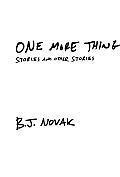 ONE MORE THING: STORIES AND OTHER STORIES by B.J. Novak
ONE MORE THING: STORIES AND OTHER STORIES by B.J. Novak
First off, gotta give respect to a new young author that pens a book of short fiction when he’s famous enough to sell a million copies of his autobiography.
Novak’s name not immediately ringing a bell? You’d recognize his face from the little NBC comedy The Office, the show where he played hipster/CEO wanna-be Ryan Howard. Or, if you’re not into sitcoms, in the Quentin Tarantino film Inglorious Basterds he played the “Little Man” Nazi-hunter. Or, if this is all sounding too R-rated for you, maybe you’d recognize him as Robert Sherman from Saving Mr. Banks.
What some of his fans don’t recognize is how multi-talented this guy is, and not in a try-everything James Franco way. For example, the guy graduated from Harvard with degrees in English and Spanish literature before becoming the executive producer, director and writer for The Office, all before staring down 25. We should be thinking of Novak as a writer first, actor second. Hopefully One More Thing will help with that.
It’s not that he wrote a collection of personal essays that are mildly fun since this guy is kinda famous. It’s not that he wrote some inside info from the stuff he’s worked on that we’re all dying to hear. It’s not that he even wrote some passable fiction and we’re just rooting for him anyway. The thing is: the stories in this book are, by all measure, just amazing.
You’ll be reminded of Sedaris when you read Novak’s fiction, except–and I’m saying this firmly and honestly–Novak’s stories are better. Yes, I like Sedaris and I’ll read his books, but, for me at least, his stories are hit and miss. Sometimes you can tell where he’s trying to go, but it’s boring along the way; sometimes he just comes out of absolutely nowhere with something horridly disgusting for what seems like shock-value alone (anyone else remember that story in Holidays on Ice where the lady sticks a baby in the dryer?). Let’s put it this way: B.J. Novak is like reading a book by Sedaris that doesn’t fall into any of the traps that Sedaris falls into.
Seriously, though, these stories are fantastic. Mostly centered on irony, they’re very dry, often darkly humored. Also, most of them are 4 pages long or shorter. The longest one I can think of was maybe 20 pages? It’s perfect, not just for someone with a short attention span, but because you only get the meat of the story. You get the joke and the punch line right away without having to hear some ridiculously lengthy setup.
Just a quick recap of some of the book’s highlight stories:
- The tale of a man who gets a sex robot only to return her after she falls in love with him.
- A boy whose winning cereal box sets him on the path to finding his real father.
- A transcript of the unaired Comedy Central roast of Nelson Mandela.
- A recap of the “Best Thing in the World” awards ceremony, hosted by Neil Patrick Harris (he wasn’t nominated, it’s addressed).
- The story of a group of friends that go to Vegas to seduce one of their buddies into an intervention, only to fall off their own edges.
- A welcome letter from Camp Fantastic for Gifted Teens.
- The story of Julie and her date with a warlord, which really didn’t go so poorly.
Also included throughout the book and at the end of the collection are discussion questions, well aware of the fact that you probably have no one you are really discussing these questions with. For instance, after the story of Julie’s date with the warlord, there’s a quick discussion period where it asks whether or not Julie should sleep with the man and encourages you to explain why or why not, and on the final page, poses the question “Do you normally have discussions in response to a question that was posed by a person not participating in the discussion? Why or why not?” Sly, meta-bastard.
Ultimately, it’s super funny, often dark, and a book that would absolutely stand alone if Novak wasn’t already a celebrity. Seriously, I loved every single minute of it.


February 26, 2014
REDEPLOYMENT
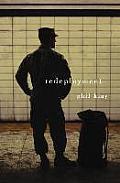 My god is Redeployment good. The debut fiction from Phil Klay is as dazzling a collection of stories as you’re likely to come across anytime soon (even acknowledging its very few weaknesses [when will 3rd-person stories return?]). Here’s what’s got to be insanely frustrating for Mr Klay: he’s written just a tremendous collection of stories which, yes, are centered around war (specifically Iraq), but because of the way folks talk about war writing (particularly fiction), he’s all but guaranteed to find a certain small collection of books mentioned again and again along with his own collection (as comparisons, as books his own book takes its place among or whatever reviewerish phrase is used, etc.), and the title most likely to be most referenced is, of course, O’Brien’s The Things They Carried. I teach parts of that collection with some frequency, so I’m not gonna here engage it other than to note the obvious: it’s good and lasting literature, certainly, and should be read by lots, etc.
My god is Redeployment good. The debut fiction from Phil Klay is as dazzling a collection of stories as you’re likely to come across anytime soon (even acknowledging its very few weaknesses [when will 3rd-person stories return?]). Here’s what’s got to be insanely frustrating for Mr Klay: he’s written just a tremendous collection of stories which, yes, are centered around war (specifically Iraq), but because of the way folks talk about war writing (particularly fiction), he’s all but guaranteed to find a certain small collection of books mentioned again and again along with his own collection (as comparisons, as books his own book takes its place among or whatever reviewerish phrase is used, etc.), and the title most likely to be most referenced is, of course, O’Brien’s The Things They Carried. I teach parts of that collection with some frequency, so I’m not gonna here engage it other than to note the obvious: it’s good and lasting literature, certainly, and should be read by lots, etc.
HOWEVER. However. Mr Klay actually deserves much, much more than reviews which merely situate his collection in any lineage. Even reaching back (as Swofford does, in his blurb) to Tolstoy and Carver and Beattie, or (as Carpenter does, in her blurd) to Conrad, Herr, and Hemingway, is a bit…not too much, and not any stretch, just not it. I don’t even know whom to compare Klay to—you can find stylistic touchstones, certainly, but on the whole the language is steady, direct and touched by searching, but then there are also these depth charges of acuity and emotion that Klay drops that just about knock you out of your chair. For instance, you’re reading about a guy (a Marine vet) going to law school at NYU and trying to figure out what to do with his life, and then there’s a line like this: “With them I’d reverted back to college, cracking dirty jokes and telling drunk stories, so when I sat down at my computer, I think I wanted to recover whatever it is that I am when I look at tht names of the dead.” That’s from “Unless It’s a Sucking Chest Wound,” one of the collection’s later stories, but all of them contain such grace and strange might and majesty at both a sentence and idea level.
In the first and title story (which begins with the speed and softness you’ll come to expect from the whole book: “We shot dogs. Not by accident. We did it on purpose, and we called it Operation Scooby. I’m a dog person, so I thought about that a lot.”), a vet returning from Iraq has to deal with his aging, declining, needs-to-be-put-down dog. It’s a terrible story—it is, like the first half-dozen stories in Redeployment, gutting and tough in the way it attempts not to solve or cure the various hurts of anyone but instead tries to just account for them, tries to acknowledge their numbers. The first half of the book’s largely like this: it features stuff closer to combat than the stories at the book’s back half, with a focus on either the acts of war or the bureaucracy and business of war (there are at least two stories [one of which: here] that are nearly, awesomely, destabilizing just for their alphabet-soupness, they’re like free jazz with military acronyms). The second half of the book—maybe last two-thirds, honestly—feature longer stories which try to track the distanter reaches of war: these stories are about the war that’s lived once away from the war, the one that tattoos these young men’s lives.
One could mount a strong (and, I’d argue, successful) argument that Redeployment‘s center’s got something to do with belief, with searching. Not, necessarily, just for stuff like meaning (though there is that, in the absolutely shattering “Prayer in the Furnace,” which is narrated by a chaplain and which is the story that comes closest to being blatantly open about any what the fuck’s the meaning of everything impulse), but also for stuff like context, purpose, utility (this is where Tolstoy comes in, to a degree). Immediately after “Prayer in the Furnace,” there’s another story, “Psychological Operations,” a story which features a vet (who happens to be Egyptian) and a black Muslim woman in something like the absolutely worst imaginable scenario: the story’s set in motion by a political correctness-type thing at Amherst College. I will 100% admit it: I began the story almost fearing the thing, what it’d become: seriously? Some this-is-our-culture, that’s-yours, let’s-work-it-out story? And yet, of course, it’s not remotely that: the story (which, along with “Prayer,” which immediately precedes it, account for nearly 120 pages in a ~290 page book, so it’s not like they’re incidental or not worth considering as the book’s centerpieces) is a mindblower of not-knowing, of not getting there. “Maybe we’ll talk another time,” the woman says near story’s end, but you know they won’t.
I could go on and on but won’t. Look, this thing is the realest real deal, and certainly the best story collection of 2014 so far, and maybe last year as well. Hard to know. It’s impossible for me at present to imagine a future in which the work of Phil Klay isn’t significant to everyone who cares about words or narrative or meaning. The book drops next week (3/3). Order it now and hope it ships early.


February 25, 2014
It’s not like he could name this ‘Check, Please!’
 VINTAGE ATTRACTION by Charles Blackstone
VINTAGE ATTRACTION by Charles Blackstone
You know that feeling when you pick up a book, start reading, and are like THIS IS THE STORY OF MY LIFE. Totally what I was expecting this book to be, for a few reasons. Number one: It’s set in Chicago, and more specifically, set in my day job. That’s a weird sentence, let me start over:
From 9 to 5 and sometimes much later into the evening, between hour-long El trips during which I cram down novel after novel, I’m an editor/writer at a Chicago travel magazine, which immediately makes people say “OMG I’m soo jealous! Do you go to France, like, all the time?” And then I do that condescending laugh that types out something like Santa’s “ho, ho, ho,” then explain, oh no, honey. I don’t get any farther than Evanston. But it’s TOTALLY WORTH IT, because I get to travel everywhere in Chicago, especially the coolest bars and the most drool-worthy and chic restaurants.
So yeah, I kinda knew the story behind Chicagoan Charles Blackstone’s Vintage Attraction (On another note here, Blackstone’s a total book nerd as well; he’s a managing editor over at bookslut.com/writer of some great and more focused reviews than this one). The story reads from the mind of this neurotic (in his own words) Woody-Allen-esque college professor Peter Hapworth, a guy who’d love to be classy and know all this cool stuff about wine, but really, his only forte is like, preposition placement. So the plot goes, this average-guy’s life gets shaken—not stirred—up (forgot to mention, I’m writing this imaging one of those movie-commercial narrators is reading it aloud to you, so go with it) when a pitch to the beautiful Isabelle Conway, sommelier and host of the fancy teach-me-how-to-wine show “Vintage Attraction,” leads to their first date. From there, the two begin a whirlwind romance through the tasting menus of Chicago to the wines of Greece.
Cool. Novel, yeah. Totally fiction. EXCEPT it’s hard to read it that way when you know this Woody-Allen-looking Blackstone guy–the actual author–is actually married to ALPANA SINGH, owner of the Boarding House, Master-and-a-half Sommelier, Chicago-It-Girl and former face of the restaurant powerhouse that is Lettuce Entertain You. She’s a real cool lady, for those of you that this is not impressing in the slightest. Oh, maybe you saw her in the last decade or so as the host of the Chicago restaurant review show, Check Please!? If not, there’s also the fact that she earned her Master Sommelier’s title at 21, making her the youngest woman to reach that level ever.
So for a girl coming into this being like, “oh, it’s a novel about his love story to Alpana!” it’s tricky to read as anything other than dirty details into their relationship. NOT FAIR, I know. It is a NOVEL I had to keep telling myself so every time I read a detail and was like, ohhhh, so that’s how it went down! Or, dammit Blackstone, you were totally being an asshole! It was a little difficult to separate reality from the story at times; probably my fault for having one tab open to Eater all day every day.
But, that said, YOU totally should. Learn from my mistakes. Read this novel, because:
(1) You’ve got an approachable protagonist, one who dines at Milk & Honey and doesn’t necessarily know what region, uh red? wine comes from until the end of the story;
(2) The killer female lead who adapts the boy into HER life. It’s refreshing. It’s as if Annie Hall took Woody Allen into her Californian life at the end of the movie instead of going back to where HE has a life;
(3) Obviously, you’re going to need to know most of this when you visit Chicago (who- and wherever you are, you should visit). He changes the names of people, but the restaurants are all real. I was name-checking along the whole time, like oh yeah, they do have good brunch. I’m lame.
Chicago lit FOREVER.


February 22, 2014
Known Unknowns
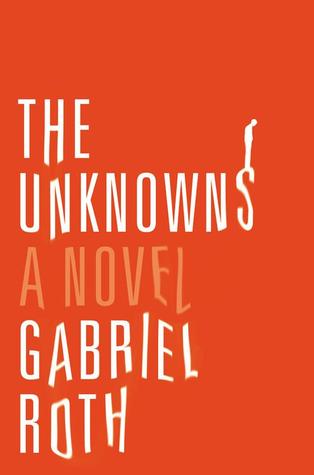 A review of Gabriel Roth’s The Unknowns
A review of Gabriel Roth’s The Unknowns
The tech boom of the 90s offered a fascinating new forum for the traditional boy-meet-girl narrative; it introduced new ways of interacting, as well as a host of corresponding new problems. It also elevated geekdom to a near-heroic level: suddenly all those awkward kids you knew in high school who spent their weekends gaming were rock stars. Not surprisingly, this movement continues to spawn a great deal of literature. Some of it, like Ernest Cline’s Ready Player One, offer little to hold onto. But others, like Gabriel Roth’s The Unknowns, deftly and compellingly explore the ways in which technology have changed our capacity to understand one another. The book isn’t flawless; at times it’s very apparent that this is a debut novel. But it’s an excellent debut, all the same, a very worth reading.
The book centers on Eric Muller, whose career as a dot-com entrepreneur has taken him from lonely teenage computer geek to witty millionaire, and yet relationships still elude him. There’s also the issue of his divorced parents: his father’s feeble attempts to start his own internet company begin to prove costly for Eric, while his mother–a recovering alcoholic–attempts to form a new life in a house paid for by her son. All of these things leave Eric struggling for direction–until he meets Maya, a San Francisco-based journalist whose mixture of brashness and vulnerability offer Eric the challenge he’s been looking for. Of course, like all nerd-hero protagonists, he begins to fuck it up as soon as he starts to learn about Maya’s past; maybe it’s just his own neuroses, or maybe his trepidation is justified.
At its heart, The Unknowns is a love story, but it’s also an exploration of the ways in which mass communications–not to mention the wealth it has afforded plenty of folks who don’t fit the traditional celebrity mold–has shaped our conceptions of masculinity. Yes, there’s the him-and-Maya conflict, but more than that there’s this abstract internal conflict about whether or not this relationship has meaning and value, what its function is. To Eric the computer programmer, romance is a thing to be analyzed just like computer code; in high school he kept a notebook featuring notes on 39 girls in his class, seemingly mundane details that he thought might somehow help him better understand women. Of course, once the notebook found its way into the hands of his classmates, his reputation as a loser was cemented, but that desire to understand the complexities of male-female interactions remained.
This is really what propels the narrative, Eric’s well-intentioned but misguided efforts to understand relationships through the same hyper-analytic drive that has made him wealthy and successful. It’s a pretty well-worn premise, maybe even hokey at times, but Roth’s voice is clear and authoritative enough to make it passable. Eric is a fun narrator, self-deprecating and neurotic, always thinking himself into a corner. Even his views regarding sex are expressed with the dry logic of one who lives in his own head: “The first time you have sex with someone it’s all about mirroring…With enough calculations per second you can generate the impression of spontaneous compatibility, the way a grid of tiny pixels becomes a photograph. (If you pick up on certain types of passivity or submissiveness from her, obviously, you want to put an inverter in the signal path so that your response is complementary rather than imitative.)”
He’s also something of a contradiction: by his own admission, he’s bashful and clueless when it comes to women, as evidenced in the notebook scene. And while his success as an adult has earned him plenty of attention from women, those original insecurities persist. At least, this is what we are told. The actual story paints a slightly different picture, one of a character who wants us to believe these things but doesn’t actually believe them himself. The problems that Eric and Maya encounter in their relationship are not exclusive to him, but more importantly he knows this.
Which, for me, was the biggest stumbling block in The Unknowns: is Eric a naive, unreliable narrator a la Holden Caulfield, or does he want us to think he is? The distinction might seem small, but from where I sit it seems to dictate whether we interpret the narrative as a man struggling against external forces or against himself. It really is a good book, funny and full of great lines, but it’s inconsistencies like these keep it from being great.


February 20, 2014
The Inside Story of The Allman Brothers Band
 ONE WAY OUT: THE INSIDE HISTORY OF THE ALLMAN BROTHERS BAND by Alan Paul
ONE WAY OUT: THE INSIDE HISTORY OF THE ALLMAN BROTHERS BAND by Alan Paul
It’s amazing, really, how long The Allman Brothers Band has been around. The Beatles lasted, what, ten years? Not even that – they were basically split when they recorded swan song Let It Be. And yeah, The Rolling Stones are still strong after decades upon decades, but they never lost their Mick Jagger or their Keith Richards. It’s fascinating to consider what would cause a group of guys to stick it out, and even more, what would make fans stay true a generation after losing a lead member. Tell me if there’s another great band that’s stayed as strong as The Allman Brothers Band – I can’t think of anyone really close.
Whatever caused this, there’s no fighting the facts that these guys are going strong; their legacy hasn’t faded into the vaults of music history. There’s the fact that, years later, a starting price ticket to see the band live is $70- that’s more than my Taylor Swift ticket, or what I dished for Rihanna. And, even though so few years of his work were able to be recorded, Duane Allman is still named among the best guitarist ever all the time. For instance, he’s in the ninth spot for Rolling Stone magazine’s “100 Greatest Guitarist of All-Time,” which I really hate to use, because there are like, two females on that list, so it’s totally not something society should look to, BUT, it gives you a parameter for how much that guy accomplished in his too few years.
Throughout One Way Out: The Inside History of The Allman Brothers Band, an amazing compilation of quotes and opinions from the living members of the band, their roadies, support staff and others, the goal isn’t so much to figure out the why of their popularity and lastability (since it seems, even the guys themselves couldn’t put their finger on the exact reason) so much as to just give you the behind-the-scenes of everything that went down, from formation to today.
It’s amazing the amount of info author Alan Paul was able to collect for this book, not just from all of the guys in the band’s current lineup (Gregg Allman, Butch Trucks, Jaimoe, Warren Haynes, Marc Quinones, Derek Trucks and Oteil Burbridge), but also from the men that were in it for years before getting kicked out or leaving of their own volition and the folks that had their flash-in-the-pan moment with the group (Chuck Leavell, Dickey Betts, Jimmy Herring, Jack Pearson, Mike Lawler, David Goldflies, Les Dudek, David Grissom, Zakk Wylde). It’s amazing to just take a moment to think about how a writer would get Dickey Betts, a founding member of the group that was forced to leave the band, to agree to help contribute to this collection, much less how he tracked down a dude like Zakk Wylde, who played one (1) show and get that guy’s take on his experience.
Perhaps the best way to understand just how Paul got all these interviews- I’m realizing now I haven’t even mentioned that he also includes interviews with Linda Oakley (founding member Berry Oakley’s wife), three of the original crew members (including the amazing-on-the-page ‘Red Dog’), members of The Grateful Dead, and a little guy named Eric Clapton- is to pay respect to each individual’s story and opinion in the same way Paul does throughout the book. There is no commentary on people’s statements. We get to see Gregg’s side of things as well as Betts without any guidance on who is right. Of course, there’s a ton of disagreement from one paragraph to the next on what actually went down, but sometimes, that’s the way truth works.
There’s the plot and all that I’m failing to mention so far. So it goes, two brothers begin making music in their teens, the older becoming obsessed with the guitar, the younger modestly following, creating a voice of his own. They get older, grow apart, and the older, Duane, begins to put together a group of the greatest musicians he can gather around himself, knowing the only person fit to be the lead singer of the group is his little brother. Gregg comes out, sings with the guys, and soon enough, the great The Allman Brothers Band is created. And there are some amazing years with the group touring together, recording together, coming into the limelight and thriving under the subtle leadership of Duane Allman. Then, too soon, Duane passes away in a motorcycle accident, leaving the group struggling to find a new leader. Yet, these guys keep going for decades and decades. That’s basically the jist of it all; what Paul does throughout the book is expand the narrative most of us know into something only the most loyal of roadies and groupies would ever get to see.



